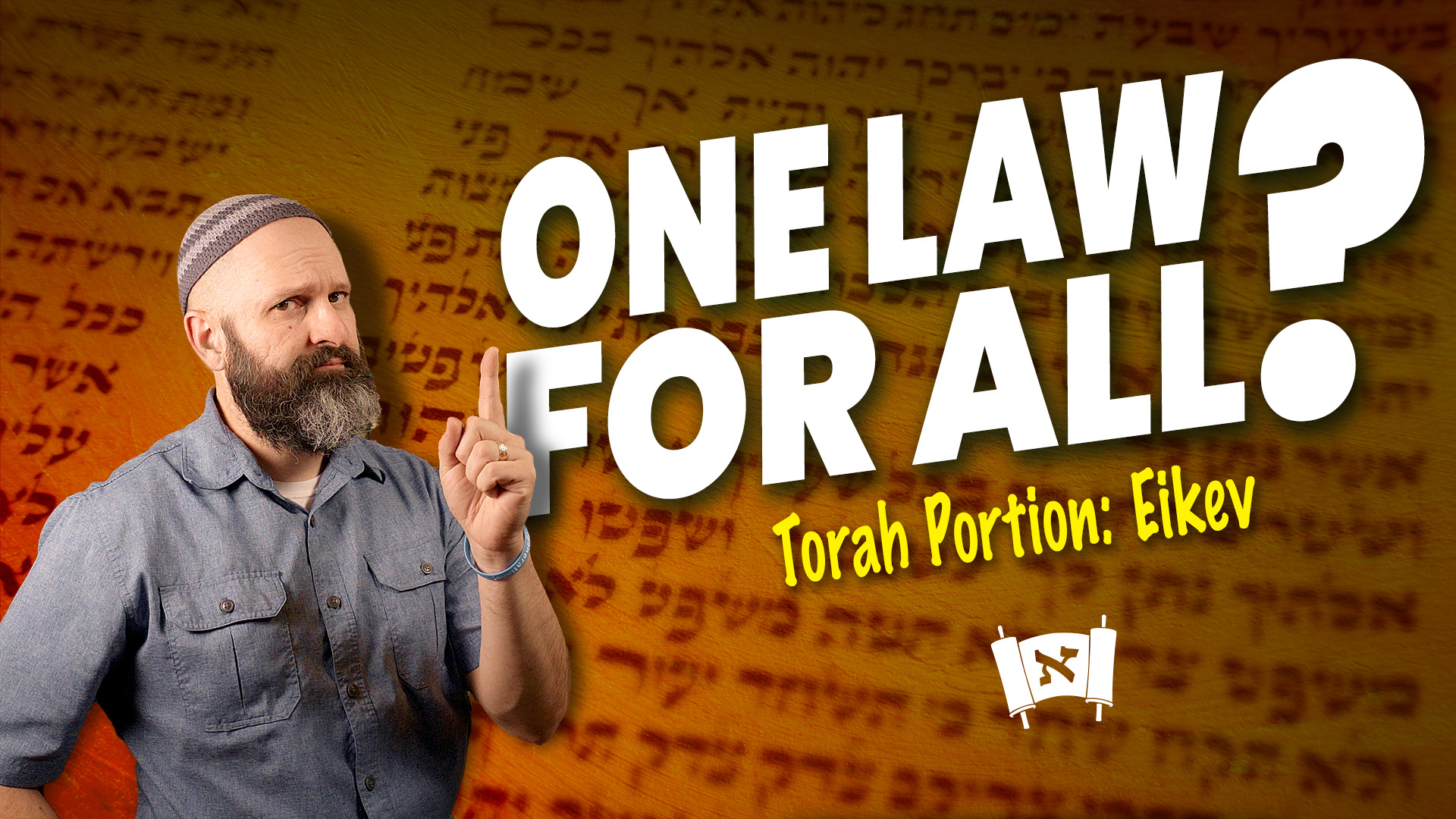The Making of a New Man

Parashat Eikev (Deuteronomy 7:12-11:25)
Righteousness & wickedness: two terms that seem to be cut & dry. But are they really? Is each person held to the exact same standard? Is the standard, “One Law For All?” It would seem that way, but maybe it isn't as black and white as it appears? Does that sound… blasphemous? Then you might want to hang around and see what’s in store, in this week’s 5 Minute Torah…
As a reminder, the book of Deuteronomy is largely a recap of the last forty years of Israelite history just prior to their crossing over the Jordan in order to begin taking possession of the land. This week’s portion, like so many others, covers a multitude of subjects, although in the stream of one continuous monologue given by Moses to the Children of Israel. Through this monologue the LORD continually reminds the Israelites of their responsibility to uphold the conditions of the covenant He has charged them with. During this process, He emphasizes the reason they are taking possession of the land He has promised them:
Do not say in your heart, after the LORD your God has thrust them out before you, ‘It is because of my righteousness that the LORD has brought me in to possess this land,’ whereas it is because of the wickedness of these nations that the LORD is driving them out before you. Not because of your righteousness or the uprightness of your heart are you going in to possess their land, but because of the wickedness of these nations the LORD your God is driving them out from before you, and that he may confirm the word that the LORD swore to your fathers, to Abraham, to Isaac, and to Jacob. (Deuteronomy 9:4–5)
In this passage Hashem tells them that they are dispossessing the other nations currently living in the land of Canaan “because of the wickedness of these nations.” But what wickedness is He speaking of and why does He contrast it with righteousness? Wickedness and righteousness are terms that are on the opposite ends of the spectrum in terms of legal responsibility. If a person is righteous they are legally fulfilling their responsibility within an agreement, whereas a person is deemed wicked by failing to fulfill their end of an agreement. With this in mind, how does Hashem define the righteousness or the wickedness of the nations? What standard of righteousness are they held accountable to?
As far as Israel is concerned, the Torah is explicit concerning their obligation to fulfill the commandments of the Torah. Last week we discussed the fact that Israel’s righteousness is defined according to the standard they were given at Sinai (see Deuteronomy 6:25). These have traditionally been enumerated as a total of 613 commandments, which include some of the more notable ones such as the keeping of the Sabbath, the dietary laws, the wearing ritual fringes, etc. But are the nations held to the same standard of righteousness that was given to Israel? Were the Canaanite nations being judged because they didn’t keep the Sabbath, eat kosher, or wear tzitzit? If not, then by what criteria did the LORD judge these nations that Israel was to dispossess?
According to most authorities, the nations are judged by the standard given to Noah in Genesis 9 after coming off the ark. The laws derived from this chapter are called the Noahide laws. These Noahide laws are categorized into seven broad categories, which include six prohibitions and one obligation. They forbid denying God, blaspheming God, murder, sexual immorality, stealing, and eating the limb of a living animal. There is also the obligation of establishing a system of just courts. These are the basic laws by which those among the nations are judged.
This begs us to ask yet another question. What about those of us among the nations who have attached ourselves to Israel through accepting Yeshua as the Messiah? How will we be judged? Will we be held to the same standard as the nations or that of Israel? This is the question the Apostles wrestled with in Acts 15. They came to the conclusion that believers in Yeshua from among the nations seem to be in a category somewhere between the two. They weren’t simply Gentiles anymore, but yet they weren’t Jews either. Therefore, they looked into the Scriptures to find an answer to this situation and made the decision to put them into the same classification as the stranger who sojourns among Israel, giving them four prohibitions:
Therefore my judgment is that we should not trouble those of the Gentiles who turn to God, but should write to them to abstain from the things polluted by idols, and from sexual immorality, and from what has been strangled, and from blood. (Acts 15:19–20)
This is based on the directives of Leviticus 17:8–18:26 that spell out the obligations of the stranger who sojourns with Israel. Thus, through Yeshua there is the creation of “one new man” Paul speaks of in Ephesians 2, whereby the former Gentile receives a new identity in Messiah. He is no longer a Gentile, but neither has he become a Jew. He has, however, become something beautiful in the eyes of Hashem. He has become a new creation, as Paul taught the congregation at Corinth, “If anyone is in Christ, he is a new creation. The old has passed away; behold, the new has come” (2 Corinthians 5:17). And although we will not be held to the exact standard as our Jewish brothers and sisters, the bar has been raised and we must work to realize the implications of such.








